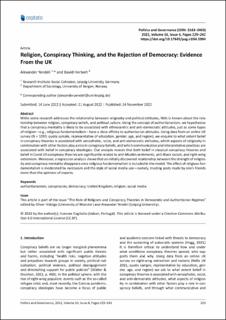| dc.description.abstract | While some research addresses the relationship between religiosity and political attitudes, little is known about the relationship between religion, conspiracy beliefs, and political culture. Using the concept of authoritarianism, we hypothesise that a conspiracy mentality is likely to be associated with ethnocentric and anti‐democratic attitudes, just as some types of religion—e.g., religious fundamentalism—have a close affinity to authoritarian attitudes. Using data from an online UK survey (N = 1093; quota sample, representative of education, gender, age, and region), we enquire to what extent belief in conspiracy theories is associated with xenophobic, racist, and anti‐democratic attitudes, which aspects of religiosity in combination with other factors play a role in conspiracy beliefs, and which communicative and interpretative practices are associated with belief in conspiracy ideologies. Our analysis reveals that both belief in classical conspiracy theories and belief in Covid‐19 conspiracy theories are significantly related to anti‐Muslim sentiments, anti‐Black racism, and right‐wing extremism. Moreover, a regression analysis shows that an initially discovered relationship between the strength of religiosity and conspiracy mentality disappears once religious fundamentalism is included in the model. The effect of religious fundamentalism is moderated by narcissism and the style of social media use—namely, trusting posts made by one’s friends more than the opinions of experts. | en_US |

